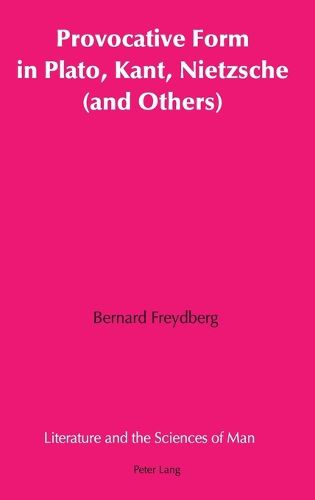Readings Newsletter
Become a Readings Member to make your shopping experience even easier.
Sign in or sign up for free!
You’re not far away from qualifying for FREE standard shipping within Australia
You’ve qualified for FREE standard shipping within Australia
The cart is loading…






This title is printed to order. This book may have been self-published. If so, we cannot guarantee the quality of the content. In the main most books will have gone through the editing process however some may not. We therefore suggest that you be aware of this before ordering this book. If in doubt check either the author or publisher’s details as we are unable to accept any returns unless they are faulty. Please contact us if you have any questions.
Provocative Form in Plato, Kant, Nietzsche (and Others) seeks (1) to liberate form from its primary affiliation with intellect and with its putative structural function; and (2) to relocate it as the correlate of imagination and desire. Through careful analyses of key texts in Plato, Kant, Nietzsche, Schelling, and others, the originary (but largely concealed) sense of form presents itself as shot through with darkness and play even as it illuminates and orders experience. Far from being secondary or settled, philosophical form is provocative by its very nature.
$9.00 standard shipping within Australia
FREE standard shipping within Australia for orders over $100.00
Express & International shipping calculated at checkout
This title is printed to order. This book may have been self-published. If so, we cannot guarantee the quality of the content. In the main most books will have gone through the editing process however some may not. We therefore suggest that you be aware of this before ordering this book. If in doubt check either the author or publisher’s details as we are unable to accept any returns unless they are faulty. Please contact us if you have any questions.
Provocative Form in Plato, Kant, Nietzsche (and Others) seeks (1) to liberate form from its primary affiliation with intellect and with its putative structural function; and (2) to relocate it as the correlate of imagination and desire. Through careful analyses of key texts in Plato, Kant, Nietzsche, Schelling, and others, the originary (but largely concealed) sense of form presents itself as shot through with darkness and play even as it illuminates and orders experience. Far from being secondary or settled, philosophical form is provocative by its very nature.